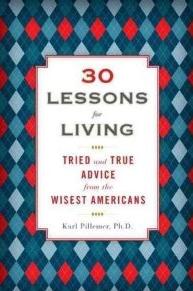 A new book by Karl Pillemer, entitled 30 Lessons for Living: Tried and True Advice from the Wisest Americans (Hudson Street Press), offers practical advice from more than 1,000 older Americans from different economic, educational and occupational strata about how to conduct a successful and satisfying life. The book has been named to the list of “Best Self-Help Books of 2011″ by Library Journal.
A new book by Karl Pillemer, entitled 30 Lessons for Living: Tried and True Advice from the Wisest Americans (Hudson Street Press), offers practical advice from more than 1,000 older Americans from different economic, educational and occupational strata about how to conduct a successful and satisfying life. The book has been named to the list of “Best Self-Help Books of 2011″ by Library Journal.
The seniors were interviewed as part of the ongoing Cornell Legacy Project, started in 2004 by Cornell professor and gerontologist Karl Pillemer with the goal of collecting practical advice for living from America’s elders. In his book, Pillemer culls from the elders (whom he refers to as his “experts”) thirty life lessons that range from the practical to the profound.
In her recent New York Times article about Pillemer’s book, science and nutrition writer Jane Brody offers the following summary of some of the book’s salient points:
On Marriage
A satisfying marriage or long-term partnership is more likely when partners are fundamentally similar and share the same basic values and goals. Although romantic love initially brings most couples together, what keeps them together is an abiding friendship, an ability to communicate, a willingness to give and take, and a commitment to one other.
On Careers
The near-universal view of the elders interviewed was summed up by an 83-year-old former athlete who worked for decades as an athletic coach and recruiter: “The most important thing is to be involved in a profession that you absolutely love, and that you look forward to going to work to every day.”
On Parenting
The demands of modern life often have a negative effect on family life, especially when economic pursuits limit the time parents spend with their children. Most important, the elders said, is to spend more time with your children, even if you must sacrifice to do so. Share in their activities, and do things with them that interest them.
Avoid making comparisons or showing favoritism. Discipline using physical punishment is rarely effective and often produces children who are aggressive and antisocial.
On Aging
Embrace it. Don’t fight it. Maintain social contacts. Avoid becoming isolated. When an invitation is issued, say yes. Take steps to stay engaged, and take advantage of opportunities to learn new things.
Rather than worrying about dying, plan for it: Get things organized, let others know your wishes, tidy up to minimize the burden on your heirs.
On Regrets
Always be honest. Take advantage of opportunities and embrace new challenges. And travel more when you’re young rather than wait until the children are grown or you are retired. Pillemer summarized the elders’ view: “Travel is so rewarding that it should take precedence over other things younger people spend money on.”
On Happiness
Almost to a person, the elders viewed happiness as a choice, not the result of how life treats you. Even if their lives were nine decades long, the elders saw life as too short to waste on pessimism, boredom and disillusionment.